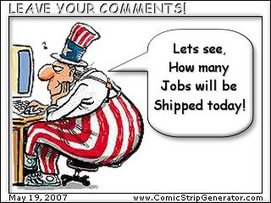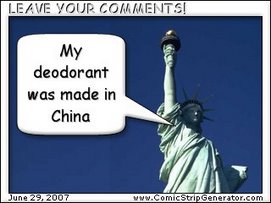Trade Deficit and Exporting American Jobs
The thin gray line is a new blog that discusses issues that effect employment in America. It’s called this because the issues facing the current American workplace have compelling arguments that are counter to a positive outcome for the American worker.
We view the arguments that are pro-offshoring and foreign competition as falling into three categories:
1. Globalization, we’re in a full world economy now so just get over it. Our importing vast sums of products assist foreign economies to grow, prosper and provide jobs for the underprivileged of the world.
2. Offshoring is good for American businesses. The myriad of services being sent overseas allows American business to compete. A healthy American enterprise is good the remaining workers.
3. Pricing improves our standard of living. Lower prices is what all of us is looking for.
These are admirable high ideals, but as with most “high ideals” they only apply over a short period of time and the real underlying issues remain. Is fair trade fair when one side welcomes imports and the other side restricts and creates barriers. As in China's Compulsory Certification program or India’s numerous trade restrictions.
Restrictions and barriers aren’t the only form of trade manipulation. China keeps a tight fist on the valuation of it’s currency, maintaining a favorable pricing structure to foster exports, they have also amassed an enormous stash of US dollars and aren’t afraid to threaten the dumping of those dollars to discourage any attempt to even the playing field. Three weeks ago they took a shot across the bow of the Democrats ship when they suggested tariffs as a way of controlling imports.
Another contemporary view is that these countries should restrict trade so they can catch up to the prosperity enjoyed in the United States. What is forgotten is that while these countries maintained their hierarchy and suppressed economic opportunities to their populations, our grandparents and parents spent decades practicing capitalism by sacrificing, investing and building for our future. Now they want to tap into our economy as a way of building theirs.
Everyone agrees that China is a repressive regime with a long standing record of human rights infractions, and that our exported oil dollars is being used to finance anti-American terrorist activities, but somehow we become the abusers if we suggest any form of intervention to protect American industries.
Offshoring became a necessary step for American manufacturers to compete with products from low wage areas. But as a result Americas manufacturing infrastructure has been in a 15 year downward spiral. Consumer electronics, textiles, steel, autos and auto parts are mostly manufactured offshore. In 1990 the U.S. Census Bureau lists manufacturing at 8.1% of total population, and 4.7% for 2006, resulting in an overall loss of 35.4% of total manufacturing jobs in little more than 15 years.
Through the 1990’s computer/Internet companies dominated the media, anything that wasn’t attached to the Internet, (or President Clinton), was second page news. This decade started with our attention on the bursting bubble and the War in Iraq. Interest rates fell to a 30 year low and the consumer, armed with fresh re-fi money, went shopping. The economy and jobs grew at a respected pace and unemployment fell to 5 year lows. But the economy was being driven by a dynamic construction market and the consumer. Job growth was being carried by construction jobs and the 1.7 million jobs added to the medical field. Take away these two categories all other job categories were flat or negative.
Since English is a relatively common language in India and wages are about a third of what they are in the US, they became the next wave of offshoring. Besides English, India has other advantages over the previous popular offshore hot spots. They also have a large population well educated in computer sciences, engineering, accounting, medical and legal professions. Offshoring for IT, R&D, product engineering, medical transcription, data entry and legal services are being offered, and embraced, by businesses large and small.
Imported products and offshore services save the American consumer money. Wal-Mart claims that they save the average family of 4 over $2300 per year. The American consumer deserves to make their purchases at the lowest price possible. But history has showed that once a market is captured by foreign competitors, prices rise. Imported textiles are still cheap, but as the dollar loses value against foreign currencies or China lets its Yuan be adjusted to a real market value, those too will rise.
Wall street is currently applauding the dollars fall in value, saying that this action will result in greater exports and growth for American industries (that export). Since imports have almost a 2:1 ratio over exports, as the dollar falls the cost of imported goods rise, and will not bring about an improvement in the trade deficit.
The Manufacturers Index came in under 5.0 for the second time this year and this has historically been an indicator of an economic downturn. The consensus on the street is that the Fed will cut rates in response. With the dollar in a long term fall the Fed may have to reverse that course and start raising rates. The thinking is that a recession would do less damage than inflation.
If we get entrenched in a recession what would be the vehicle that pulls us out. We had Reagan’s investment tax credit program that ignited manufacturers and businesses to capitalize in the 80’s but if they get the building bug again it will be offshore where labor is easier. In the 90’s it was the computer/Internet explosion and they’re having great success in India. So far this decade we’ve had a construction boom that would require low interest rates to reignite, and a very lively consumer that has built up considerable debt in the process. If the consumer takes a breather, I have to wonder which segment of the economy will spark an upturn.
The trade deficit by itself could easily be overcome by a resilient citizenry, they have come together in the past, to surmount much greater. But when combined with a lack of direction from Washington, a diminished manufacturing infrastructure and a business community committed to relieving themselves of the burdens that being an employer in the United States carries, some other unforeseen sector has to kick-in.











0 comments:
Post a Comment